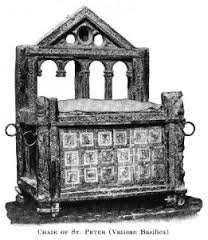This might seem an odd time to discuss the SSPX, as things unravel in our world – terrorism, war, murder and ideologies – all the while the Church, or at least the current Magisterium, seems to be imploding in on itself in a modernist muddle. But it’s at times like these that we must not lose our bearings, especially when times are so fractious, the desire – one could say the temptation – to find a ultra-secure refuge all the more poignant.
I’m prompted to write again, by Kennedy Hall’s cri de coeur, ‘Can we Finally Drop the SSPX Debate?’ posted on 1P5 at the end of November. I’d like to drop the whole things as well, but questions remain that must be resolved, without answers to which things may in the end be much worse for those who love Tradition – myself included. Mr. Hall has become a sort of crusading apostle for the ‘Society’, with an full-book apologia, and articles galore. The SSPX has apparently offered him, and many others, a refuge from the chaos engulfing the Church.
But we must be cautious. I won’t here rehearse all I said in my previous thoughts on the situation of the SSPX, and will only clarify the following points in Mr. Hall’s apologia pro societatem. They will only make sense if you read over his piece.
- I will say at the outset that I sympathize with the SSPX, and want much of what they want. Contrary to what Mr. Hall implies, not everyone who points out certain legal irregularities with the society is an enemy of the SSPX. Some have the good of the SSPX in mind, desiring to see their aspirations flourish, and not end in misery.
- I have not watched either Father Sherry’s or Matt Fradd’s videos, but the truth value of either should not be gauged by the number of views. Otherwise, Gangham Style and Taylor Swift would be the gospel.
- Large churches in the American Midwest are all well and good, but if they were a sign that their construction is perfectly in accord with God’s will, well then, we’ve got to give it to the Mormons, whose Tabernacle in Salt Lake City easily seats 3500 (a far cry from Saint Peter’s 60,000 or so, but still).
- It would do us well to distinguish ‘legalisms’ in the Pharisaical sense from ‘law’ in the canonical sense. As Thomas More warned his son-in-law Roper, if we mow down the laws, what’s to protect us from the full force of evil?
- Law that works against the ‘expressed end of the Church’ is, to Mr. Hall, a ‘legalism’. But who’s to define the ‘expressed end of the Church’, and more to the point, how to reach said end? I would like to hear of the diocese(s) where the SSPX is in ‘normal’ relations with the bishop, and how that works.
- To claim that there would be no Traditional Mass without the defiant acts of Archbishop Lefebvre is to limit the infinite providence of the Almighty. As Saint Philip Neri was fond of saying, ‘God has no need of men’, and He would have found another way. This is not to play armchair quarterback, but to make a simple theological point. All we can say, a posteriori, is that, somehow, God did use Archbishop Lefebvre. The only ‘indispensable Man’, however, is Christ – and, even here, Saint Thomas says God could have chosen a different path to save us – as Christ prayed in the Garden – even if the Way that was willed was the most, well, fitting.
- Was Lefebvre one of the ‘greatest men of the 20th century,’ and will he one day be canonized? I don’t dispute that he was a holy man, with his life as a missionary in Africa, his love of the Mass and all that is good. But God permits the temptation of the good, with the good, and the best, with the best. Saintly men are tested with all that is true and beautiful, at the very acies of their being. Such was the original fall of Man: Right end, but wrong means, to attain what would have been given. The comparison I offer in my previous article is that of Moses before the rock of Meribah. God would have given the water, along with the promised land, to Moses had he done what he was told to do. But even Moses was impatient, and lost trust.
- Which brings us to the nub of the matter, and which colours the SSPX to this day, which is the notion of obedience and rightful authority. If it be true Archbishop Lefebvre was told by Pope John Paul II that he would ordain one of his priests a bishop – and there is no reason to believe it untrue – and if Lefebvre agreed to this, only to renege, demanding four bishops, whom he would choose, well, we have a problem. What might have happened had Lefebvre obeyed, and gone along with the original offer? Of the four bishop ordained by Lefebvre, one has already departed to ‘do his own thing’, and we will see what happens when the SSPX faces the need for a new bishop, as the current remaining three age out their time. Will they ordain again without papal mandate?
- The final paragraphs of Mr. Hall’s apologia raise the stakes, implying that the whole Novus Ordo endeavour, and anyone who has gone along with it, presumably, has committed a ‘sin against the Holy Ghost’, to which he asks, ‘is anything more evil’? Is not the sin against the Holy Ghost traditionally taken to be final despair, and not liturgical imprudence and aberration (if it be so)?
I agree that many things implemented in the wake of the Second Vatican Council leave a lot to be desired – and likely much of that has to do with punishment for our sins. We’ve wandered in a liturgical desert for decades, but that may be to awaken us to a deeper appreciation of what we had, as has been abundantly demonstrated with many – especially those younger – flocking to Tradition.
Yet this debate on the SSPX cannot be dropped quite yet, for the simple reason that this raises issues far beyond the status of the SSPX, even if the ‘society’ provides a flashpoint of the controversy. There is more to all of this than just the Traditional Mass, deep questions about the very being of the Church, the rightful role of the hierarchy, and who belongs thereto. A glimpse into the mind of some members of the SSPX may be found in a sermon by one of their priests, Father Michael Johnson, who claimed that ordinations in the new rite are all invalid. This, of course, would mean that the priesthood, Eucharist and all the other sacraments are found only in the SSPX, and perhaps a few other traditional societies. Hence, in Father Johnson’s perspective – a rather narrow one – there are but a few hundred thousand Catholics ‘eating His flesh and drinking His blood’, with the other two billion or so just making believe.
Has this priest been sanctioned, and his views corrected?
Then there was their official U.S. spokesman, Mr. James Vogel, in a podcast on Crisis last year, said that members of the society should forego their Sunday obligation if they cannot attend an SSPX Mass – regardless even if there is another traditional Mass nearby. How, pray tell, is this not an abrogation of the First Commandment?
How many in the SSPX share, or tolerate, such views? Do they think the revised rite of the sacraments ‘work’, and can they provide a path to holiness? What other views does the Society hold, and who does speak for the SSPX in an official capacity?
Would God so abandon His Church, and leave it to one man to ‘save’ only those few in the SSPX, and that by an act of disobedience to the supreme authority in said Church, a Pope who has been canonized as a saint, and who, from what accounts I have read, went to great lengths to accommodate Lefebvre?
Leave aside for a moment the question of how will the SSPX respond if the Vatican – this Pope or a future one – censures or even dissolves the society, or refuses to permit future episcopal ordinations, or revokes their faculties for confession and marriage. One can only imagine. But what if they are asked something less grievous – that they (think) they need? So far, Pope Francis seems to be supportive – and we may be thankful – but this itself is disconcerting, given his publicly stated opposition to the usus antiquior and his insistence on one unified modus orandi. Does the Pope have some sort of plan up his papal sleeve? The SSPX is in a more precarious and potentially fissiparous position than may be realized.
The problem here is that without some sort of ‘submission of mind and will’ to the supreme authority in the Church – whether or not that we think that authority is exercised well – there is no principle of correction and guidance to any society, or any individual. This does not mean mindless obeisance, but it also doesn’t mean doing what one likes under the perpetual get-out-obedience-free card of an ever-expanding sphere of ‘necessity’, regardless of what answer one receives. What is necessary, after all, is a bit of a spectrum, as Thomas says, from the absolute, to the it-would-be-fitting, and there are legitimate ways of working around unjust laws. There’s no sense painting ourselves into an indefensible corner, or drifting off on the deep blue sea on an isolated liturgical ice floe. As pleasant as that may be for a time – lots of liturgical freedom on that waterfront – the inevitable eventually happens.
I will say it again: I am not an enemy of the SSPX, and desire their full union, and rejoice that hopeful and fruitful steps are being made in that direction. I agree with Kennedy Hall that a return to Tradition is in order, and I wish the Society all the best in striving for such – but all within the right order, and the right means. As Christ exhorts, have patience. Deus providebit in His own time, in His own way – and within His own Church. Like Apostles in the storm-deluged boat, the Word will calm the current storm with but a word.
And as wait for that Word made Flesh, may these last days of Advent bring many graces to you all, and may all the joys of Christmas be yours. +











